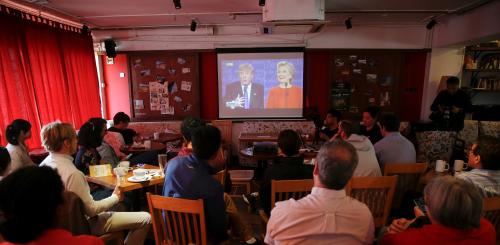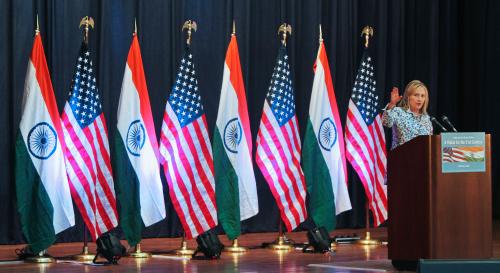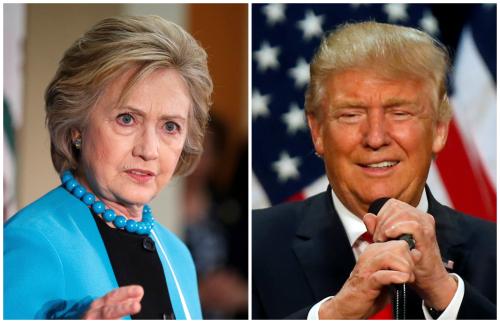Unlike Republican presidential nominee Donald Trump, who only became well-known in China quite recently, Democratic presidential nominee Hillary Clinton is no stranger to the Chinese. She has been on their radar since her time as first lady in the 1990s. In 1995, she delivered a groundbreaking speech at the U.N.’s Fourth World Conference on Women in Beijing, declaring: “women’s rights are human rights.” The Chinese government censored the speech soon after, as it resented being embarrassed on the world stage.
Today, Chinese officials tend not to be very fond of Clinton (as evidenced by opinion pieces in state media). The broader Chinese public, however, appears to have more mixed views.
Official circles
In 2013, when Clinton finished her term as secretary of state, the Global Times (a tabloid affiliated with official People’s Daily newspaper) issued a special report marking her departure. It described her as “the most hated American political politician among Chinese internet users” and blamed her for “severely sabotaging China’s bilateral relations with its neighboring countries in…a short period of time.”
In April 2015, on the same day Clinton announced that she was entering the 2016 presidential race, an article about her appeared on the public WeChat account (a mobile social messaging app) of the People’s Daily Overseas Edition. The piece summarized Clinton’s “historically tough dealings with China” and portrayed her as an anti-China politician. It cited:
- Clinton’s bashing of China’s human rights record in 2008, supposedly to help win support during the 2008 presidential primary;
- Her critiques of China’s internet freedom in 2010, when Google publicly accused China of hacking into the email accounts of human rights activists and dissidents;
- Her interview with The Atlantic in 2011, in which she called the Chinese government’s attempt to crack down on dissent “a fool’s errand”;
- Her assertion in 2012 that China’s fast-growing investment in Africa was a form of “new colonialism”;
- Her claim in 2013 that the disputed Diaoyu Islands (known as the Senkaku Islands in Japanese) are under Japan’s administration; and
- Her suggestions that she supports fostering a “color revolution” in China.
Other government-affiliated opinion writers in China have claimed, for instance, that she was the “evil initiator” of the South China Sea disputes, since she declared the issue a U.S. and regional security concern at the ASEAN Regional Forum in Hanoi in 2010.
Social media
Rhetoric from the Chinese public on social media often echoes official rhetoric on Clinton. In a society where a woman has never had a seat on the Chinese Communist Party’s Politburo Standing Committee (China’s inner circle of power), a standard put-down of a strong woman is usually to call her “harsh,” or worse, and to connect success in her career to failure in family life. On Chinese social media, comments on Clinton can be both sexist and ageist. Users on Chinese social media platform Weibo often quote Trump’s now famous comment recalling her husband’s infidelity (“If Hillary Clinton can’t satisfy her husband what makes her think she can satisfy America?”).
A reader comment on a Peng Pai News report on the investigation into Clinton’s use of private email server reads, perhaps characteristically: “She is so old. Why can’t she go home and help raise children?” It is widely believed in China that women over 55 (the legal retirement age for women there) should stay home and help babysit their grandkids. So for Clinton to now run for president of the free world is off-putting to many Chinese.
But there is another, more favorable view of Clinton in some Chinese circles. She has won an increasing number of admirers—mostly women, feminists, liberal intellectuals, and social libertarians—for her achievements as a woman. On the official Weibo account of the Sanlian Life Weekly magazine—which tends to have a more liberal readership—an article describing Clinton’s impressive political career generated a lot of positive attention. Commenters expressed fondness and respect for her as someone who shows “extraordinary courage and perseverance.” One comment reads: “I admire her courage to pursue her dreams at this age”; another reads: “She is my role model as a woman. [We should all] struggle for a noble ideal regardless of our gender, nationality, and personal difficulties.”
When five young feminists were detained by Chinese authorities in 2015 on charges of “picking quarrels and provoking trouble” after planning a multi-city protest aimed at bringing an end to sexual harassment on public transport, Clinton called Chinese President Xi Jinping “shameless” on Twitter. That boosted her popularity among young Chinese feminists. In an interview with CNN, Li Tingting, one of the five detainees, said: “[Although] I do not agree with all of Clinton’s politics, what matters the most is what a Clinton presidency would symbolize for women—even in China.”
Overall, therefore, while the state media tends to espouse dislike for Hillary Clinton, the general public is more mixed in its views. Whether or not U.S.-China relations are likely to be better under a Clinton presidency or a Trump one is a different question, one that we will take up in a future post.






Commentary
What Chinese people think about Hillary Clinton
Friday, July 29, 2016